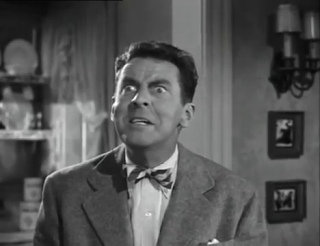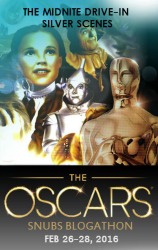The following is my contribution to the Oscars Snubs Blogathon, being co-hosted Feb. 26-28, 2016 by The Midnite Drive-In and Silver Scenes. Click on the above banner, and read bloggers’ defenses of Academy Award nominees that didn’t win the golden statuette!

I’ve been looking for an excuse to write about Joe McDoakes, and this blogathon gives me a perfect excuse to do so.
“What the heck is a ‘Joe McDoakes’?”, I hear you cry.
Joe McDoakes was a series of 63 one-reel comedy short subjects produced by Warner Bros. between 1942 and 1956. George O’Hanlon — later to gain his greatest fame as the voice of George in the TV cartoon “The Jetsons” — played the title character.

George O’Hanlon as Joe.
The shorts began as a project of Richard Bare, a film professor at USC who wanted to show his students how to make a movie. (After the McDoakes series was retired, Bare made further use of his offbeat sense of humor, as the director of a wonderfully wacko TV series titled “Green Acres.”) The shorts were directed by Bare and also written solely by him up through 1948, at which point O’Hanlon took a hand in the storylines as well.
The series’ raison d’etre was to place Joe in an everyday situation and, usually, watch him bollix it up through stubbornness or misplaced overconfidence. The first few shorts showed Joe going through the motions of an activity (as in the debut short, So You Want to Quit Smoking) while an offscreen narrator commented on Joe’s actions. Eventually, Joe and his supporting cast were allowed to speak, although the narrator (usually the delightful Art Gilmore) wasn’t abandoned until 1948.
I could spend an entire blog cataloging the virtues of this achingly hilarious series of shorts. (As it happens, I devoted an entire website to it instead. Click here if you’re interested in the minutia of the Joe McDoakes series.)
Suffice to say, three of these short subjects were deservedly nominated for Best One-Reel Short Subject Academy Awards; undeservingly, none of them won the statuette. For the purposes of this blogathon, I will center my attentions on the 1950 Oscar nominee, So You Think You’re Not Guilty.
(Oh, yeah, I forgot. At this point, I’m dutifully supposed to mention 1950’s One-Reel Short Subject Oscar winner, Paramount’s Aquatic House-Party. Anyone who has devoted a blog or website to this immortal movie gem, please leave your URL in the “Comments” section below.)
(Also, the remainder of this blog entry contains complete spoilers of So You Think You’re Not Guilty. So skip to the last two paragraphs if you truly intend to obtain the movie in one of its rare forms, which I’ll discuss later.)
At the start of the movie, Joe is driving his convertible through town with his wife Alice (Phyllis Coates, best known as TV’s first Lois Lane on “Adventures of Superman”). Joe dutifully stops at one of those old-style traffic lights where the “Stop” and “Go” signs pop up and down appropriately. Here, though, the signs go haywire, causing Joe to drive skittishly and cause a traffic jam.

A policeman pulls Joe over and politely tries to deal with him. But Joe brashly proclaims his innocence, despite the fact that he has neither his driver’s license nor his vehicle registration to hand over to the cop. The cop writes Joe a traffic ticket and tells Joe he can pay the $2 fine in court and be done with it. But in court, “innocent” Joe makes such a nuisance of himself that the judge fines him first $50 for contempt, then $75, and finally $100.

So Joe has just multiplied his losses by 50. Not good enough for him, though — now he wants a trial. Sadly, Mr. Battin (Ted Stanhope, above left), Joe’s lawyer, isn’t nearly as concerned about Joe’s innocence as Joe is. While the prosecutor (Willard Waterman) pulls out every shameless tactic possible, including a “witness” to the incident (a blind man with a seeing-eye dog), Battin says nothing.
At the end of the prosecutor’s song-and-dance, Battin whispers to Joe, “I got an ace in the hole. Watch this!” Battin slowly stands up and announces, “The defense rests.”
For some reason, this doesn’t pacify Joe, who creates such a scene in the courtroom that he gets another $1,000 tacked onto his fine and is sentenced to 30 days in jail. While in his jail cell, a fellow prisoner coerces Joe into breaking out with him. Joe tries to escape through the window, but his suspenders get stuck on what’s left of the sawed-off bars. Joe is quickly captured and sentenced to 10 years for an attempted jail break.
Next we see Joe out in the jail courtyard, having served a year of his sentence. A fellow prisoner (a nifty cameo by Douglas Fowley, a gangster in late-era Laurel & Hardy movies) says that when they both get out of jail, Joe needs to look him up. The con is getting into a new racket that’s perfect for Joe: “Signal-fixin’ radar — ya always got the green light!”

Joe is called to a meeting with the warden (Ralph Sanford), who asks Joe if he really did commit the crime of which he’s been accused. Hard-boiled Joe gladly admits to the crime and says he’ll do it again when he gets out. Ironically, now that Joe has finally admitted his guilt, the warden says that Joe is qualified to get out of jail. “‘Stop-Lite’ McDoakes Paroled,” reads a banner newspaper headline.

Joe, once again free and driving, makes the very same driving mistake at the very same traffic light. But no heroics this time — as soon as a cop approaches Joe, he throws $2 at the cop and begs him to pay off the ticket.
I wish this movie was available for posting here. Sadly, this wonderful short subject and its 62 brethren are as rare as an Oscar was for the series itself. If you want to see So You Think You’re Not Guilty by itself, it’s available as an extra on Warner Bros.’ 2005 DVD release of the James Cagney classic White Heat.

Also, the entire McDoakes series is available for purchase on demand. Depending on if you buy a new or used set, it costs anywhere from $32 to $50 at Amazon.com — but IMHO, it’s worth every penny. (If you don’t want to take my word for it, click here to read critic Leonard Maltin’s rave review, which inspired me to buy the set sight-unseen.) I think you’ll agree that Not Guilty and a good number of these other shorts were simply robbed at Oscar time.



This sounds like a terrific series – and a character that I personally can really identify with. (Don’t get me started…) Forget Leonard Maltin’s review. Your review alone was enough to sell me! 🙂
LikeLiked by 1 person
oohh – sounds intriguing. I confess I have no knowledge of this – but this is what I like about these blogathons – a chance to learn about “new to you” films. Thanks for a great post.
LikeLiked by 1 person
I’ve always loved the Joe McDoakes comedies and eagerly waited for the DVD release. Sadly, like most shorts, they are largely overlooked, even among avid film fans. Thanks for spotlighting old Joe for the Oscars blogathon! On side note : his son, George O’Hanlon Jr. was an actor too and starred in the Hardy Boys/Nancy Drew Mysteries television series in the 1970s.
LikeLiked by 1 person